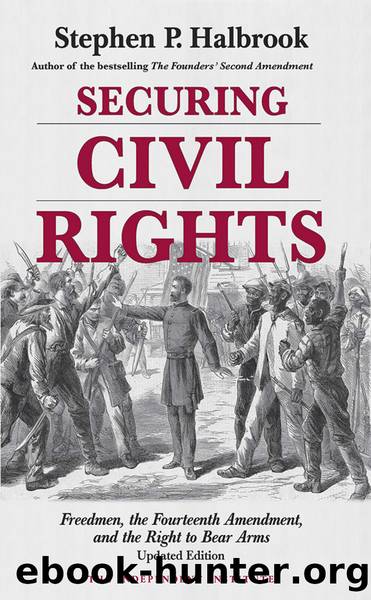Securing Civil Rights by Stephen P. Halbrook

Author:Stephen P. Halbrook
Language: eng
Format: epub
Publisher: Independent Institute
Published: 2021-01-15T00:00:00+00:00
6
From the Klan Trials and Hearings Through the End of the Civil Rights Revolution
Indictments Based on the First and Fourth Amendments
AFTER PASSAGE of the 1870 Enforcement Act,1 which protected rights âgranted or securedâ by the Constitution, federal prosecutors began bringing indictments alleging interference with the right to vote on account of race and violations of Bill of Rights freedoms. After federal courts in Alabama and Mississippi upheld such indictments, a concerted effort was made to bring similar indictments against members of the Ku Klux Klan in South Carolina.
In May 1871, Circuit Judge William Woods of the Southern District of Alabama upheld an indictment charging that the defendants conspired to injure persons âwith intent to prevent and hinder their free exercise and enjoyment of the right of freedom of speech, the same being a right and privilege granted and secured to them by the constitution of the United States.â2 Another count alleged interference with âthe right and privilege to peaceably assemble.â3 The government conceded that these rights preexisted the Constitutionâs adoption and hence not âgrantedâ by the Constitution, but contended that the rights to free speech and assembly were âsecuredâ by the Constitution, and thus protected by the Enforcement Act.
Observing that the Bill of Rights originally only limited federal action, Judge Woods explained that the Fourteenth Amendment was intended to enforce the Bill against the States.4 The privileges and immunities protected by the Fourteenth Amendment, he wrote, include âthose which in the constitution are expressly secured to the people,â such as the rights to free speech and assembly.5 Judge Woods found Bill of Rights guarantees âsecuredâ by the Constitution because:
They are expressly recognized, and both congress and the states are forbidden to abridge them. Before the fourteenth amendment, congress could not impair them, but the states might. Since the fourteenth amendment, ⦠the states are positively inhibited from impairing or abridging themâ¦.6
Judge Woods did not limit his remarks to the First Amendment, but added that âthe other rights enumerated in the first eight articles of amendment to the constitution of the United States, are the privileges and immunities of citizens.â7 Accordingly, Congress could enforce them by appropriate legislation.8
Another Enforcement Act prosecution took place in June 1871 before Judge Robert A. Hill in the U.S. District Court for the Northern District of Mississippi.9 The indictments alleged that disguised men hanged Alexander Page, a freedman, with intent to hinder him âin the protection of his life and liberty so secured to him by the said Constitution of the United States,â and contrary to his right of âpersonal security.â10 Defense counsel argued that the indictment really charged murder, a State offense, which could not be sustained under the Reconstruction amendments or the Enforcement Act, and that Congress had no power to secure the rights of life and liberty to citizens.11
In Judge Hillâs opinion, âbefore the adoption of the fourteenth amendment,â the protection of life and liberty was left to the States, âthe Federal Government being prohibited from restricting [these rights].â12 To secure equal rights
Download
This site does not store any files on its server. We only index and link to content provided by other sites. Please contact the content providers to delete copyright contents if any and email us, we'll remove relevant links or contents immediately.
| Africa | Americas |
| Arctic & Antarctica | Asia |
| Australia & Oceania | Europe |
| Middle East | Russia |
| United States | World |
| Ancient Civilizations | Military |
| Historical Study & Educational Resources |
Machine Learning at Scale with H2O by Gregory Keys | David Whiting(4284)
Never by Ken Follett(3924)
Fairy Tale by Stephen King(3361)
Oathbringer (The Stormlight Archive, Book 3) by Brandon Sanderson(3117)
The Man Who Died Twice by Richard Osman(3057)
Will by Will Smith(2894)
Rationality by Steven Pinker(2345)
Can't Hurt Me: Master Your Mind and Defy the Odds - Clean Edition by David Goggins(2315)
The Dark Hours by Michael Connelly(2294)
Friends, Lovers, and the Big Terrible Thing by Matthew Perry(2209)
The Dawn of Everything: A New History of Humanity by David Graeber & David Wengrow(2185)
Principles for Dealing With the Changing World Order: Why Nations Succeed and Fail by Ray Dalio(2028)
HBR's 10 Must Reads 2022 by Harvard Business Review(1830)
A Short History of War by Jeremy Black(1829)
Go Tell the Bees That I Am Gone by Diana Gabaldon(1745)
A Game of Thrones (The Illustrated Edition) by George R. R. Martin(1701)
515945210 by Unknown(1659)
Kingdom of Ash by Maas Sarah J(1655)
443319537 by Unknown(1540)
